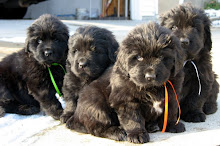Monday, October 23, 2023
Does Dog Breed Affect Behavior?
(akc.org)
"A recent study published in Science investigated whether a dog’s breed determines their personality, based on community science data sourced from Darwin’s Ark. Outlets like the New York Times framed the expansive study’s results with provocative headlines like, 'They’re All Good Dogs, and It Has Nothing to Do With Their Breed,' but is it really that simple?
'I think it’s dangerous to say to someone that it doesn’t matter what breed of dog you get … I’m really anxious about some of the messaging that’s out there about this paper,' study co-author Dr. Jessica Hekman said on the Cog Dog Radio podcast. She told the American Kennel Club that the study’s original intent was to add to the scientific literature about dogs in regards to behavior, and 'not to provide guidance for people buying pets.'
We spoke to dog experts in training, health, and genetics, as well as study co-author Hekman herself, to understand more about why dog breeds and genetics definitely do matter, and how socialization of any dog or breed is key to bringing out the best expression of a dog and their personality.
Do Different Dog Breeds Have Different Personalities?
Every individual dog is just that: an individual. While one dog may rush to the door excited to greet visitors while another dog of the same breed may just lounge on the couch unbothered, the type of dog breed will likely predict common traits, including how energetic or stubborn your pet may be. According to Dr. Jerry Klein, Chief Veterinary Officer for the American Kennel Club, as soon as humans began to domesticate dogs, they chose dogs that were easiest to manage and handle, as well as those useful for day-to-day activities like hunting, guarding, and companionship.
'Through selective breeding over many, many, many generations, certain qualities and traits were continuously selected, refined, and became more ingrained in some dogs, eventually becoming a certain group of dogs (Sporting, Sighthounds, Scenthounds), and then further still, becoming breeds,' he explains.
Penny Leigh, CPDT-KA and program manager for AKC Canine Partners and the AKC GoodDog! Helpline, agrees. 'Purebred dog breeds have been developed, some for hundreds of years, for a purpose, whether that be cuddling on laps, hunting birds, herding livestock, or pulling sleds,' she says. 'They were selected for traits that would produce the best dogs for their intended jobs—and those traits still define their personalities today even if they are not being used in their intended roles.'
There may be specific behavior differences between similar breeds within a breed group, like the Herding Group or Terrier Group, or within a subgroup, like pointing breeds or setting breeds, explains Dr. Jerold Bell, Adjunct Professor of Genetics at the Cummings School of Veterinary Medicine at Tufts University. However, the differences between these groups are based on hundreds of years of selection for specific behaviors.
'There is no question that ‘instinct’ is a strong factor in purebred dog behavior when you see a weeks-old puppy frozen on-point, or a herding dog circling the family children, or all other stereotypical breed behaviors,' Dr. Bell says.
Adding a new dog to your life is exciting, but it’s also a serious commitment. You need to meet your new pet’s physical and psychological needs for their entire life, not to mention training and socialization to ensure they’re properly equipped to interact with people and other dogs. While all dogs vary in their own unique personality, it still holds that if the breed you choose isn’t the right match for your lifestyle, the key behaviors that have defined that breed over generations can prove to be a struggle that leads to frustration, disappointment, or an unhappy dog.
Does Dog Breed Matter? Yes, for Many Reasons
'While the personalities of individual dogs will vary, just as human siblings will have different personalities, a dog’s behavioral tendencies will reflect their breed,' Dr. Bell says. 'Prospective owners need to understand the expected behaviors and needs of the individual breeds to determine whether these fit in with their family and lifestyle.'
A suitable match is key to a happy life for both you and your pet. You don’t want to end up rehoming an energetic Sporting breed because they weren’t a fit for your chilled-out lifestyle of apartment lounging. 'Choosing the wrong breed for your lifestyle can lead to frustration for you and your dog,' Leigh says. 'If you are a couch potato, then you do not want to be partnered with a high-energy dog who wants a job—and if you love to hike and jog, then you do not want a dog that would rather snooze the day away.'
So, if different breeds have different temperaments and distinguishing traits, how do you choose the right one for you? As part of the AKC’s mission to promote responsible dog ownership, we’ve always maintained that researching the different dog breeds you’re interested in is critical. This helps a prospective puppy or dog owner narrow the field to pick breeds that are an overall good match for your lifestyle—beyond just breeds that have the physical traits you prefer, or that you find to be the most 'cute.' You need to know what that breed needs in terms of space, exercise, mental stimulation, and grooming to ensure the dog you bring home fits your lifestyle.
However, choosing a particular breed does not mean you’ll get a carbon copy of personality with each dog—rather you can understand their breed’s general tendencies, which can help you decide if that breed has the baseline potential to be a good fit for you, and it will also help guide the kind of training the breed will need.
While there are no guarantees about how your dog will behave, Dr. Klein feels if people make educated, informed decisions they can commit to caring for a dog for the dog’s entire life. 'Understanding the breed standard and characteristics will help potential owners determine if a specific dog is likely to mesh well with their home, lifestyle, environment, time commitment, and expectations,' he says.
When speaking specifically about acquiring a dog from a breeder on the Cog Dog Radio podcast, Dr. Hekman explains, 'Your best way to have a dog that fits well into your home—no matter what the breed—is to interact with the breeder who is producing those dogs. You should (buy your puppy) from a breeder who knows their lines well, and you should tell that breeder what your expectations of the dog are: what you want the dog for, what you can provide for the dog, what’s a dealbreaker for you. And you should find the kind of breeder who is willing to say, and who is happy to say, ‘This is not the right dog for you,’ if it’s true, and then you should listen to them.
'That’s the real message. And at that point, it doesn’t matter what breed, because you’ll go to the (Belgian) Malinois breeder and they’ll be like, ‘I don’t think this is the right dog for you if you don’t have time to walk it, and you have a two-year-old crawling on the floor.'
How Do You Bring Out the Best Behavior and Personality in Your Dog?
You’ve likely heard of the 'nature versus nurture' concept when it comes to dog behavior. A dog’s breed, hard-wired personality, and behavior traits are essentially the 'nature,' while socialization and training are 'nurture.' Leigh explains that socialization is the most important thing a person can do when they bring a new puppy home.
'Positive experiences as a young puppy stay with the dog for life and will help it mature into a more confident, well-rounded adult dog,' she says. 'Genetics also definitely play a role. Some breeds are naturally more reserved and less trusting of strangers—and some are social butterflies who love everyone from day one. Still, socialization helps all dogs adapt better to people, animals, and situations that they will encounter through life.'
Another important way to bring out the best in your dog is to train your dog. For example, some breeds are high drive and easily aroused, but teaching impulse control and focus will help channel those qualities in positive ways. In other words, you can’t change the personality a dog is born with, but you can help bring out its best expression. Like a naturally shy person can use tools to build confidence in public speaking, you can give a timid dog the tools to be more confident and self-assured.
'A dog that is a little skittish and shy might never ever be the life of the party, but through training, socialization, and confidence-building, you can make huge strides to help your dog cope with almost any situation,' Leigh says.
Choosing the breed with the best personality to fit your lifestyle, then socializing and training that dog, gives you the best opportunity to build a fulfilling, lifelong relationship and bond with your dog. As Dr. Klein says, 'Dog breeds have very distinct physical and personality traits, and it is important that people understand and familiarize themselves with those traits. That is the best way to ensure success in your relationship with any dog.'
Dr. Hekman echos this point, and told the AKC that she agrees that socialization of the dog itself plays a major role in how they express their personality. Not only should you choose a breeder that does a good job at socializing the newborn puppies, but you should also continue that work once you bring your dog home. 'But it’s not everything, and you’ll definitely improve your chances of getting the right dog for you if you are also thoughtful about what breed you bring home,' she says.
News Takes on the Dog Breed Study vs. The Study Itself
It’s important for any dog lover, dog fancier, or especially new puppy seekers to take note that news coverage of the study that was published in Science isn’t the same as the study itself, and that a particular take from a news website isn’t necessarily the point or intent of the study. 'I don’t think this paper should be used to help you decide how to get your next puppy, because that’s not what we tested,' Dr. Hekman said on the podcast.
She cautioned, 'Be careful with what you’re reading. You may be reading what a journalist’s take on the paper is rather than the actual paper. If you go to the page that the paper is hosted on, you will find a paragraph at the beginning of that—before what we the authors wrote—which is the take of an editor of the journal. It was not written by the (study) authors. That little paragraph does end with saying that you should not use breed to determine what kind of dog you’re buying as a pet. The (study) authors didn’t write that. I don’t want to speak for anybody else but myself, but I disagree with that statement. And I have no power to have it taken down.'”
Subscribe to:
Post Comments (Atom)














































No comments:
Post a Comment